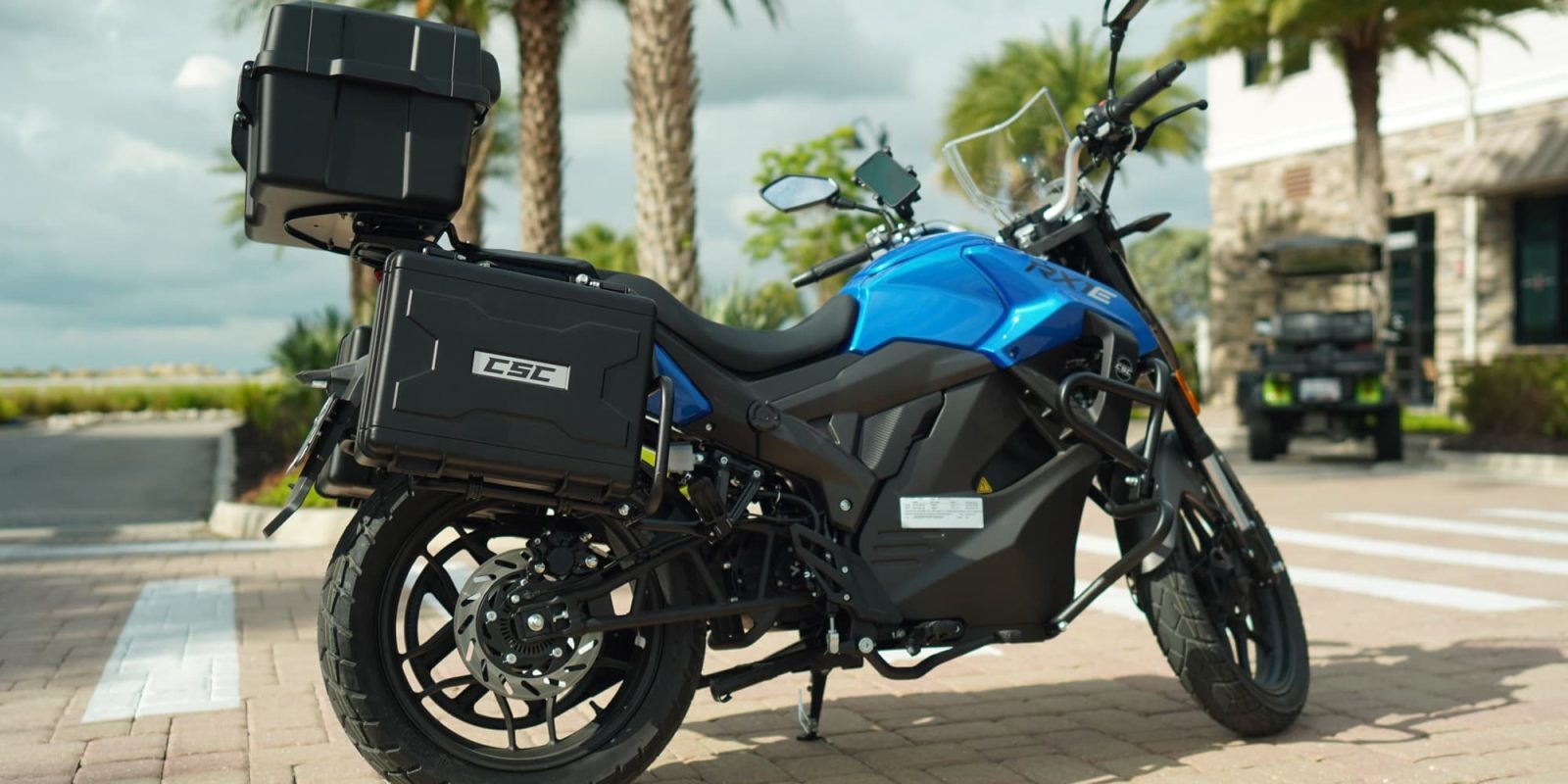
The CSC RX1E is a rare breed of electric motorcycle in the US. It’s fast and powerful enough to hang with the big boys, yet it doesn’t come with an over-the-top price.
How well can a budget-priced highway-capable electric motorcycle ride? That’s what I set out to find out in this complete review of the CSC RX1E.
To be fair, I had test-ridden one last year for a couple of hours in the foothills over Los Angeles, having a blast while canyon carving on the bike.
But since this is really more of a mixed-commuter/street bike (despite the adventurous appearance), I knew it was going to be important to test it out in an everyday utility role as well.
So now that I’ve had several weeks on the bike, I can give you my complete thoughts on the CSC RX1E. And you can also check out my experience in my video review below. Or if you’re more of the reading type, keep on scrolling down for all of my thoughts on this fun electric motorcycle.
CSC RX1E Video Review
CSC RX1E tech specs
- Motor: 8 kW nominal, 18 kW peak midmounted liquid-cooled motor
- Top speed: 80 mph (130 km/h)
- Max City Range: 112 mi (180 km)
- Battery: 96V 64Ah (6,144 Wh)
- Typical refueling cost: $1.40
- Full charge time: 6 hours on Level 1 (110VAC wall plug), 20-80% in under 3 hours
- Curb weight: 469 lb (212 kg)
- Max load: 331 lb (150 kg)
- Brakes: Hydraulic brakes with Bosch ABS
- Suspension: Inverted hydraulic fork with 4.7” travel, rear monoshock with 4.3-inch travel
- Wheels: 17-inch cast aluminum
- Extras: Large glove compartment, rear pillion seat, LCD instrument display with analog speedometer, included crash bars and cargo boxes, USB port for phone charging, center stand
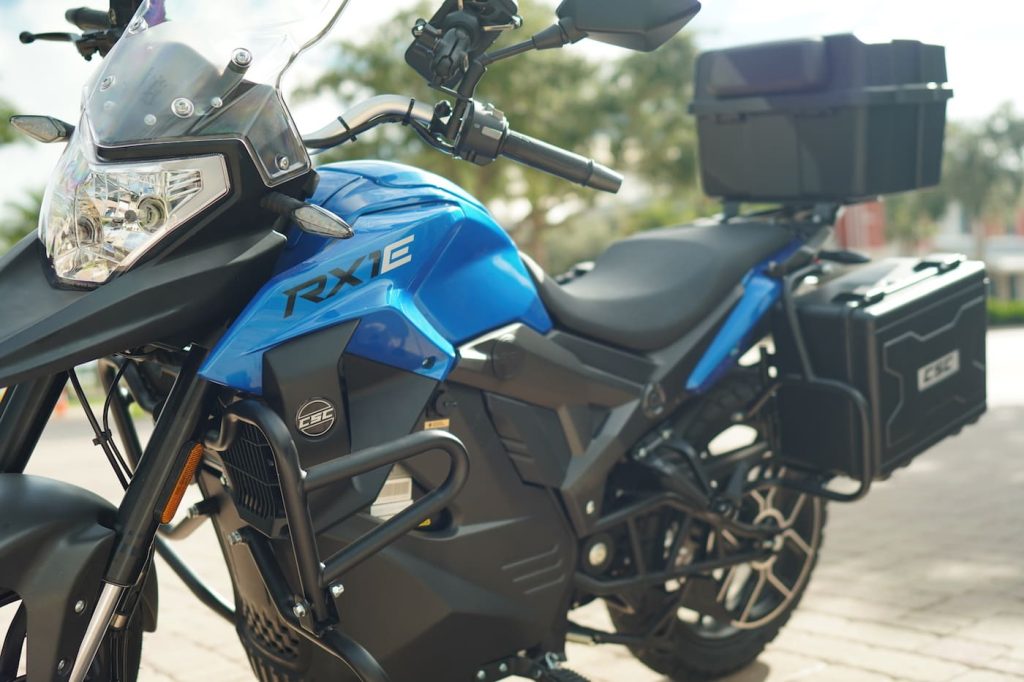
All the performance, fraction of the cost
CSC’s claim to fame with its electric motorcycles has always been finding an attractive balance between performance and cost. That usually sees CSC’s bikes landing at several thousand dollars below the competition, yet still coming with admirable specs and features.
That’s the case here too. With a top speed of 80 mph (130 km/h), a city range of 112 miles (180 km), and a peak motor power of 18 kW (24 hp), it’s fairly comparable in performance to a Zero FXE. But the $8.5K CSC RX1E saves some serious coin compared to the $13K Zero FXE.
Plus, CSC is kindly offering a $500 off discount when using the coupon code ELECTREK, making the bike even more affordable.
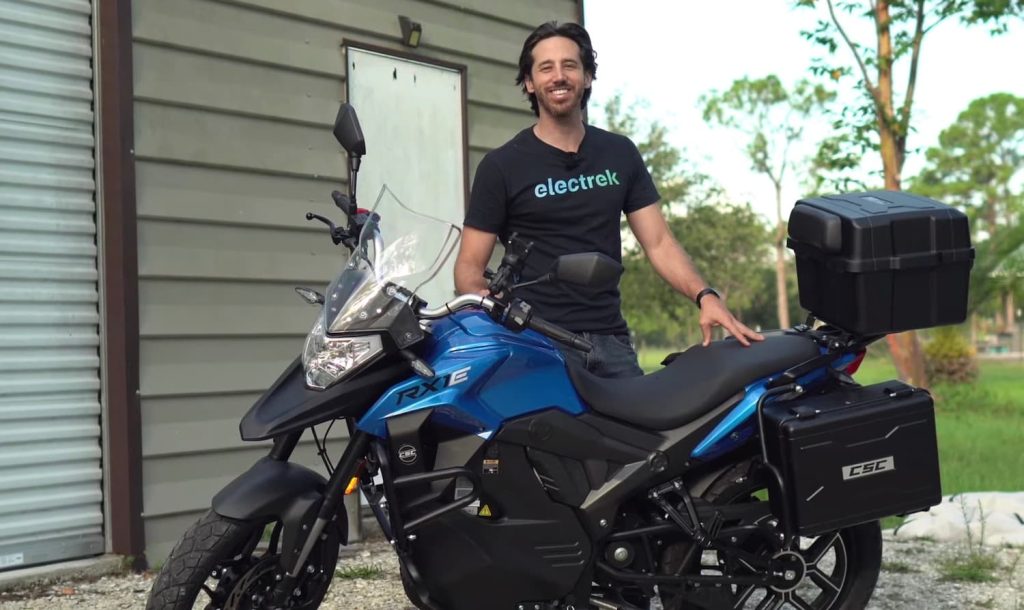
A deeper look at the specs comparison shows that they both have similar top speeds, battery capacities, and ranges. The Zero FXE has nearly twice the power and is around 130 pounds (55 kilograms) lighter, though. Both of those mean sportier acceleration, which will make the FXE more thrilling off the line. But the RX1E’s comfort and easy riding are its calling card, not its extreme power.
It’s got many of the standard features that come with most nicer electric motorcycles, such as Bosch anti-lock braking, adjustable brake lever, multiple ride modes, backlit display, and a spacious glove box for storage. But it also comes with several other features that many competitors lack, such as a reverse mode for maneuvering in a parking lot and a water-cooled motor to keep the bike working under sustained high-power situations, like long hill climbs and repeated hard acceleration.
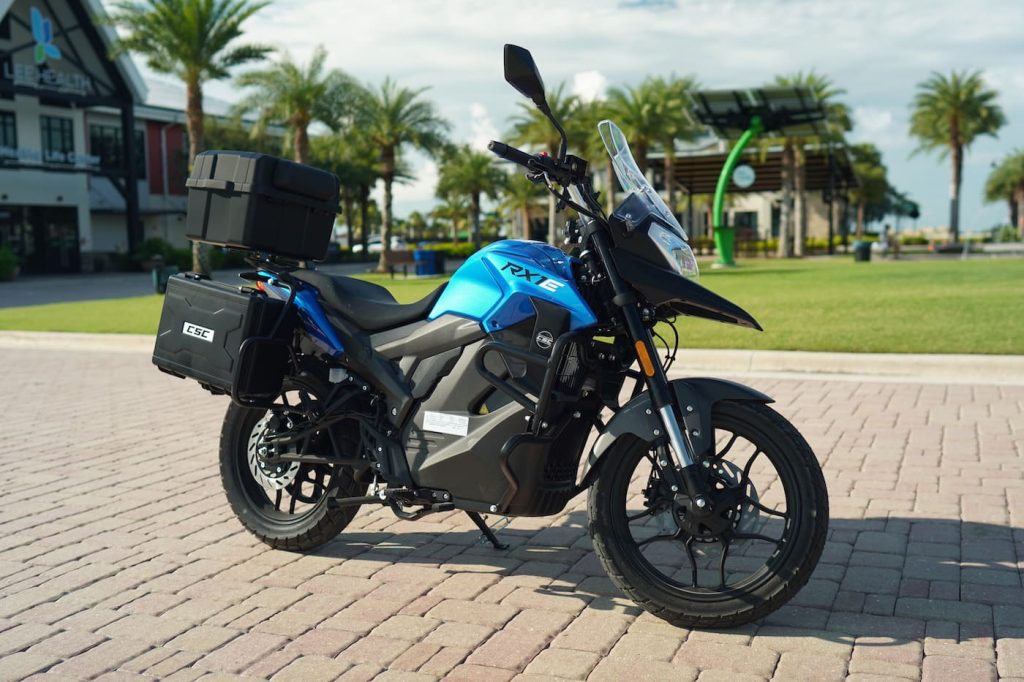
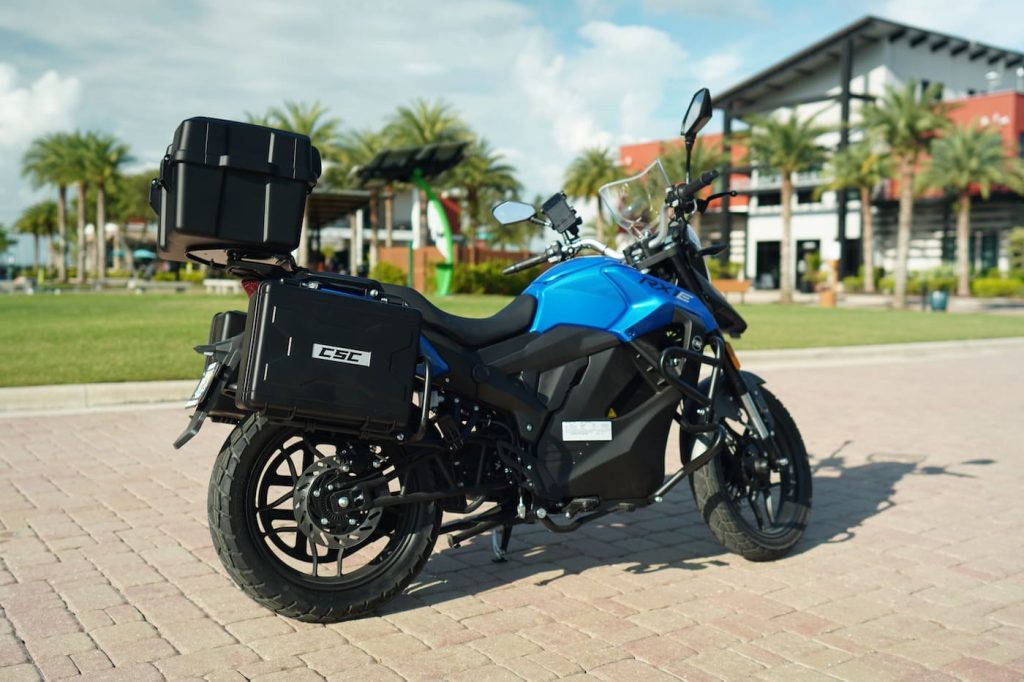
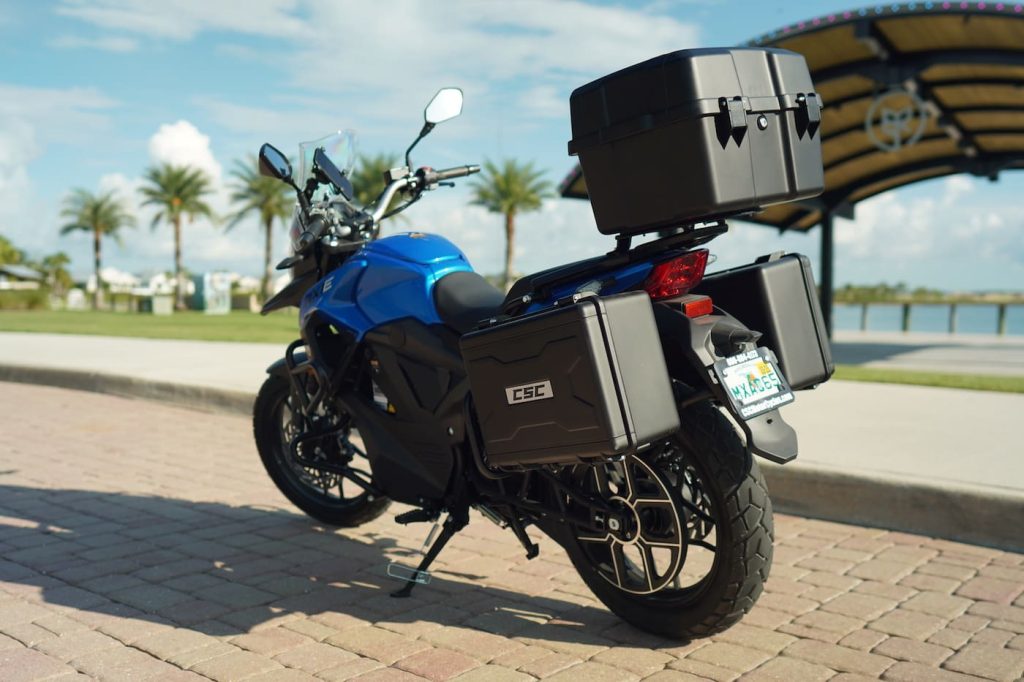
A street bike in an adventure bike clothing
Don’t be fooled into thinking that this is an adventure bike. It sure does look like one at a passing glance, largely thanks to the included cargo boxes and crash bars. But this is really more of a street bike than anything else.
That doesn’t mean it doesn’t benefit from the adventure bike exterior. The stance has you riding up tall in what feels like a much more comfortable riding position for me. I do enjoy adventure bikes and feeling less cramped, so I appreciate the geometry here.
The tall windscreen helps guide the air stream around your meat sail of a body too, meaning you don’t pay as high of an aerodynamic price for sitting up tall and pretty. Between the large windscreen and a full-face helmet, you actually slip through the air more aerodynamically than you might expect.
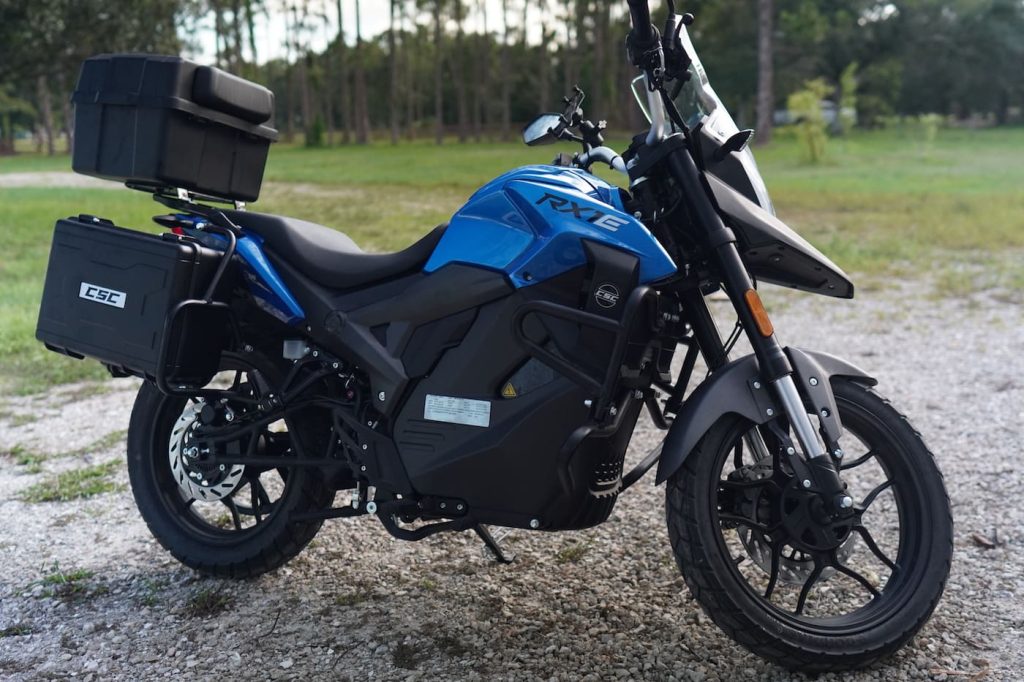
The cargo boxes are great for running errands, food shopping, and general utility. They’re not amazing quality, though, so I wouldn’t trust them for actual security. Sure, they’re locking boxes. And CSC even takes the added step of making sure that all three cargo boxes share the same single key profile with the glove box and the key start, meaning you only have one key to deal with despite five lock cylinders on the bike. But the boxes are made from molded plastic instead of metal, and they feel like you could pry them open with a Harbor Freight screwdriver. So you should think of them more like saddle bag storage for carrying things with you, not as a high-security locking system for long-term storage. I can fit nearly a week’s worth of groceries on the bike, though, so they are a big plus.
The only downside is the top box makes it hard to swing a leg over. I’m only 5’7″ or 170 cm, and so I have to spear my leg over the center to mount the bike since there’s no way I’m going over the tail box without needing to ice my groin afterward. It’s fine, and it works to just spear a leg over the center, but you may wind up removing the top box if you prefer to swing a leg over easily. My sister tested the bike out too, and she’s only 5’3″ (160 cm), so it’s fine for shorter riders as long as you have the hip flexibility to get your leg over. Taller riders will naturally be fine.
The 30.9-inch seat is also low enough that you aren’t up on your tip-toes. I am able to flat-foot it in my riding boots, which isn’t true on all motorcycles I’ve tested.
If you want to remove the crash bars and cargo boxes, you’ll end up with a more street-looking bike that weighs around 33 pounds less. Considering the stock weight is 469 pounds (212 kilograms), dropping down to 436.5 pounds (198 kilograms) might be worth it for some.
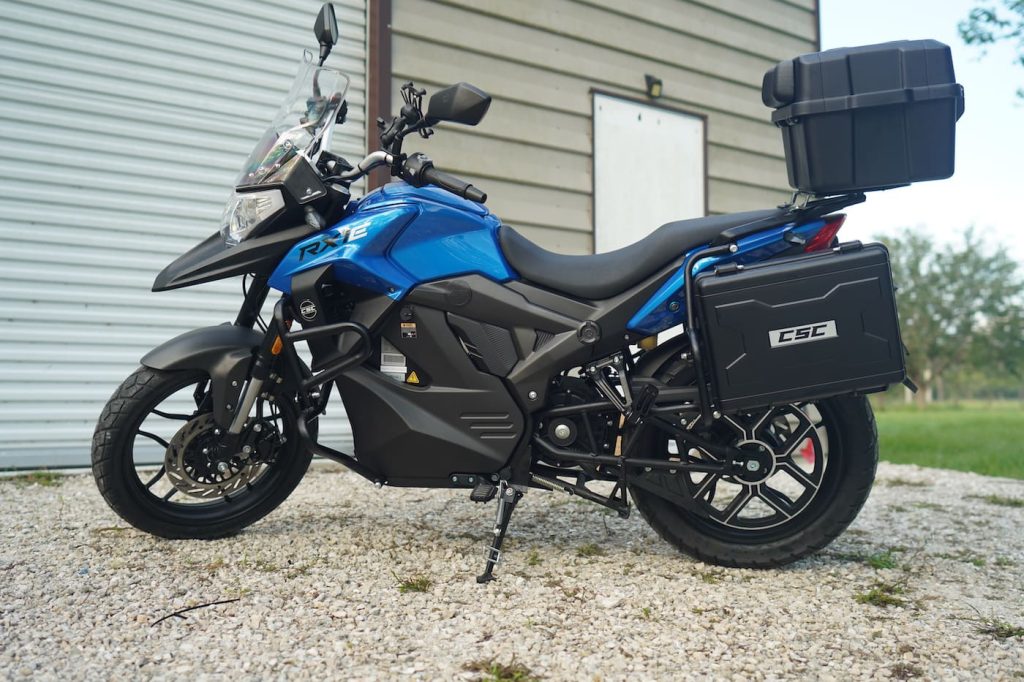
What’s the real range?
The speed is plenty fast, and I GPS-clocked it at a true 80 mph (130 km/h). But it’s the range that most people will really be interested in. They claim a max range of 112 miles (180 km) at city speeds, and that checks out if you’re truly riding around at 25-30 mph (40-50 km/h). There are plenty of cities where it’s hard to get up above 30 mph, so I get it. But when you have a bike like this, you’re going to want to ride faster.
When I put it in Sport mode (you also have Eco and Comfort), I can blast right up to 80 mph, but the range takes a hit. I generally keep it in the middle mode (Comfort Mode), which lets me get up to around 70 mph or so and is easier on the battery. Once, after going too many exits at top speed on the interstate, I was getting a bit worried about range. So I put it in Eco Mode, and I got home just fine.
When I cruise at an average speed of 50 mph or so, meaning mixed city and highway, the range seems to drop to between 50-60 miles (80-95 km). Sustained purely highway riding will drain the battery even quicker, so this isn’t the best bike if you want to do long-distance highway trips. The battery is less than half the size of flagship electric motorcycles like the LiveWire One or the Zero SR/S. Of course, the price is also a third of those flagship models, so you get what you pay for.
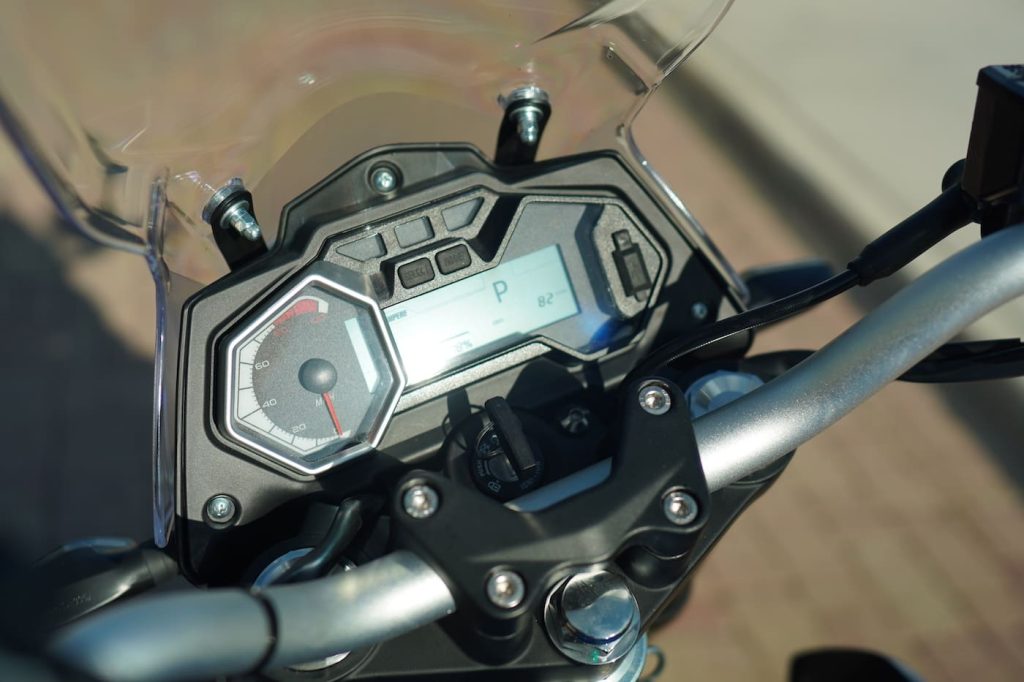
What would I like to see improved?
Three areas irked me from the start. The first was that the weather stripping for the glovebox was cut too long, meaning it would lift up sometimes, and I’d have to push it back down into place. I eventually cut it to the correct length myself, which helped, but it still sometimes slips off when I pull something big out of the glove box. But then again, I’ve seen fit and finish issues on $20,000 motorcycles too.
Second, and this is a minor complaint, but I would have LOVED for the bike to include a helmet hook under the saddle. These are quite common and make it easy to lock your helmet on the bike. Since this is a commuter e-moto that is perfect for utility riding, meaning you could be on and off several times while riding through the city and making stops, being able to leave your helmet locked on the bike would be a big advantage. All of my scooters have this, and many motorcycles have it. It would have been a simple addition, just a metal hook welded to the frame under the saddle or even a plastic extrusion molded in. But alas, it doesn’t have a helmet hook for locking your brain bucket. That’s a shame.
Lastly, the center stand requires some serious muscle to use. I love to see a center stand included since it makes parking on an incline much safer and is also incredibly useful if you ever need to do some work on the bike. Many bikes and scooters are balanced such that it doesn’t take too much effort to rock the bike back on the center stand. But damn, the RX1E doesn’t do you any favors there. My 100-pound sister would never in a million years be able to do it. I can knock out 20 pullups in a row, but the first time I put this bike on the center stand, I still had to reset and brace for it with a second attempt. It’s certainly doable, but it ain’t easy.
The fact that I have to reach so far to find complaints, though, is a testament to the fact that the bike is actually really well designed. I can always nitpick about small details, but the big stuff is all spot on.
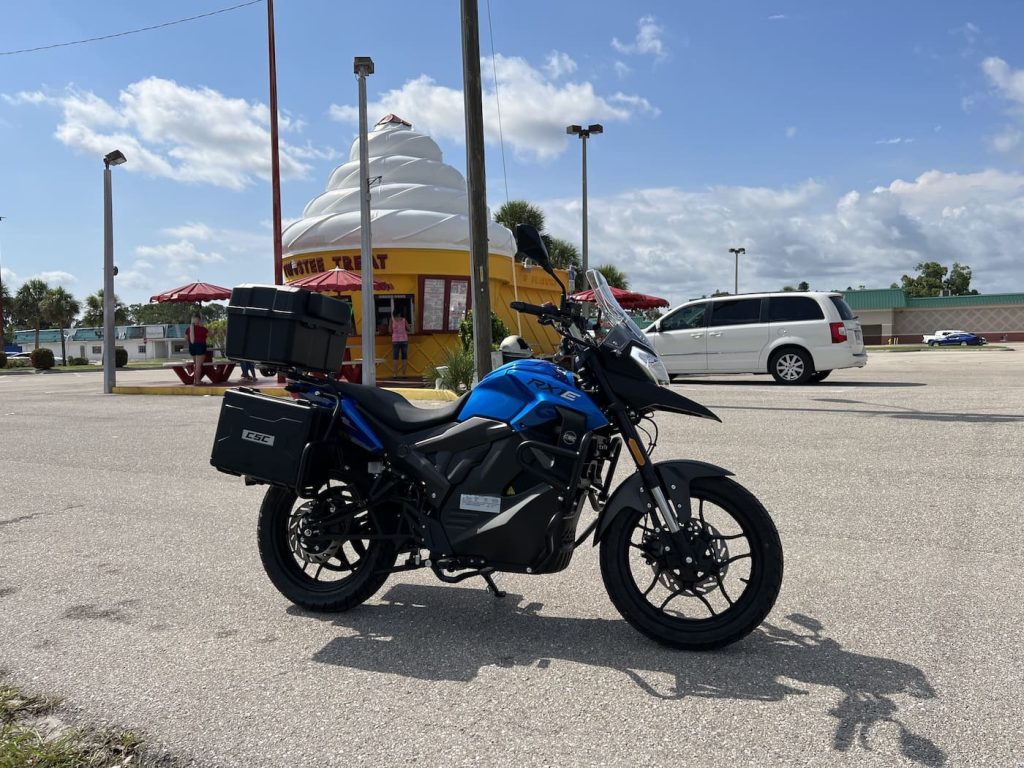
What is the CSC RX1E good for?
The RX1E is an awesome electric motorcycle and a great addition to the marketplace. But the somewhat limited range at high speeds means it’s important to keep in mind what the CSC RX1E is meant for. If you need to commute 60 miles on the interstate and then still have battery left for cruising the city once you get there, this is the wrong bike for you. You’ll cut it too close. But if you have a 20-mile interstate commute and then need to do another 5-10 miles of city riding, that’s a better use case and will leave you plenty of extra battery for “just in case.” If you have a 110V plug near work that you can use, you can, of course, double your effective range by charging while you’re at work.
The RX1E can also be a fun recreational bike, as I discovered in the canyons outside of LA. But then again, it’s not going to give you all day riding. The charger is a quite nice-looking unit that plugs into 110V AC, like your basic garage outlets, but it’s still going to need a good four hours or so to give you an almost complete recharge. So remember that this is a commuter motorcycle, not a long-distance tourer.
This is a motorcycle for anyone who wants to commute to work or school on a route that requires highway or interstate riding and who also wants a bike that looks good while being fun to ride hard. It’s got good power and great utility. The liquid-cooled motor and belt drive are an excellent setup for the drivetrain, and it’s even got plenty of battery capacity when used within its element.
Will it ever replace a LiveWire S2 Del Mar? No, but it’s not trying to. That bike can go from a standstill to 60 mph in three seconds flat. The RX1E does it in closer to eight seconds. That is acceptable for a highway on-ramp, but it’s just not a powerhouse for a thrill ride. As long as you’re looking for a dependable commuter e-moto and not a flagship bike, the RX1E is likely going to be a great option for you.
